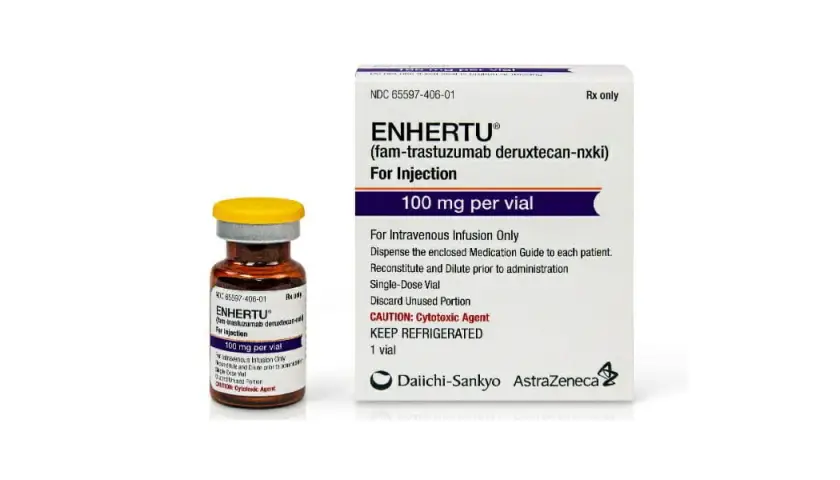
AstraZeneca and Daiichi Sankyo have claimed approval in the EU for Enhertu as a second-line therapy for HER2-positive metastatic breast cancer, moving the drug up the treatment pathway.
The green light from the European Commission means that Enhertu (trastuzumab) deruxtecan) can now be used for patients whose disease has progressed after first-line therapies such as Roche’s Herceptin (trastuzumab) plus chemotherapy, a standard regimen for this type of cancer.
In the DESTINY-Breast03 trial, Enhertu reduced the risk of disease progression or death by 72% versus Roche’s Kadcyla (trastuzumab emtansine), which has been a go-to second-line therapy for HER2-positive advanced breast cancer for many years.
Three-quarter of Enhertu-treated patients were alive without disease progression at 12 months in the study, compared to 34% of the Kadcyla group, although there was a trade-off in increased risk of interstitial lung disease (ILD) and pneumonitis with AZ and Daiichi Sankyo’s drug.
Around 10% of patients treated with Enhertu developed ILD or pneumonitis, compared to less than 2% of the Kadcyla group, although most of the cases were grade 1 and 2 and none were severe or life-threatening (grade 4 or 5).
” his approval is an important milestone for patients and clinicians in Europe, since previously treated patients with HER2-positive metastatic breast cancer typically experience disease progression in less than a year with historical standard of care treatment,” commented trial investigator Javier Cortés of the International Breast Cancer Centre in Barcelona, Spain.
Moving Enhertu into earlier lines of therapy in tumours with high levels of HER2 expression – as well as so-called HER2-low cancers – is the key to Enhertu achieving its multibillion-dollar sales projections.
The new second-line indication was approved by the FDA in May, leading analysts at Jefferies to predict that it could add $500 million in worldwide peak sales for Enhertu and start to unlock larger market opportunities than with its use in later-line cancers.
That’s a sizeable step up for a drug that has been growing fairly slowly, bringing in $76 million for AZ in the first quarter of 2022, given that Kadcyla sales came in at $525 million in the same period, albeit with its growth driven mainly by an indication as an adjuvant (post-surgery) treatment for patients with HER2-positive early breast cancer.
The new approval also brings Enhertu into direct competition with Seagen’s orally-active HER2 drug Tukysa (tucatinib), which is also approved for this patient setting on the back of data that doesn’t look quite as strong as the results achieved by Enhertu.
Seagen is predicting Tukysa will fall back a little this year from $334 million in 2021 to the $315-$335 million range, although its hoping that a soon-to-be-filed new indication as a combination with Herceptin in HER2-positive colorectal cancer could return the product to healthier growth.
The big leap forward for Enhertu is expected to come if it secures approval for HER2-low breast cancer and other HER2-low tumours, which analysts at Credit Suisse said recently could expand its sales by $3 billion.
AZ needs sales to pick up substantially, given that it paid $1.4 billion upfront to license rights to the drug in a deal that could be worth up to $6.9 billion.
Enhertu was previously approved as a third-line therapy for HER2-positive metastatic breast cancer and a second-line therapy for HER2-positive metastatic gastric cancer.
The post AZ, Daiichi challenge Roche with EU okay for earlier use of Enhertu appeared first on .